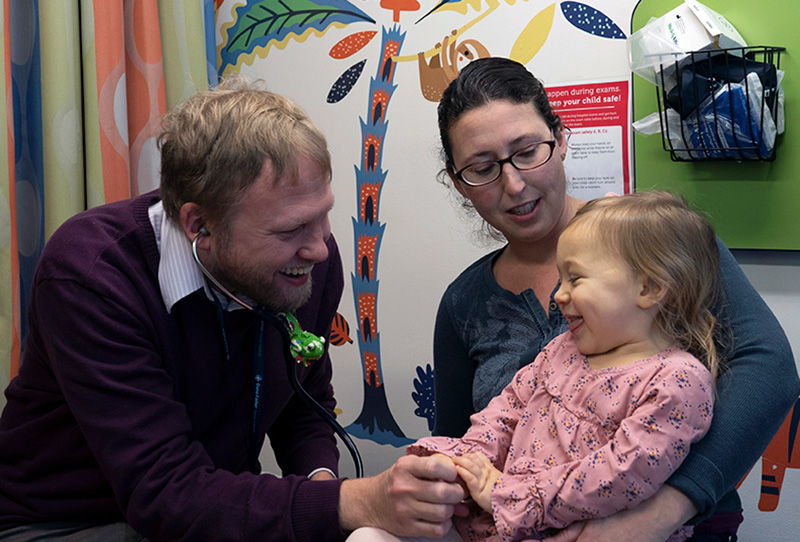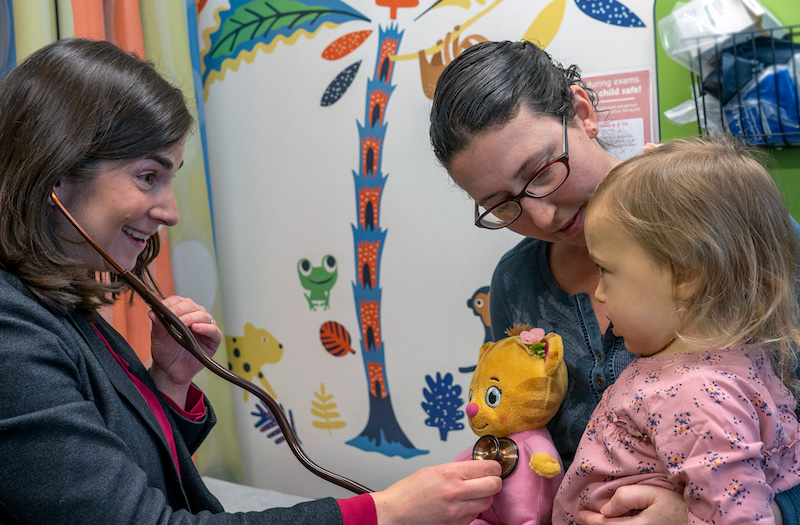Scarlette: Hoping for a bright future with PK deficiency

Two-year-old Scarlette Walker loves pink. For her January visit to the Hematology Clinic at Dana-Farber/Boston Children’s Cancer and Blood Disorders Center, she wore a shocking pink hat and pink dress. “She picked them out herself,” says her mom, Olivia. She even has a pink alter ego. “She pretends she is a pink helicopter named Dizzy. If you need help, Dizzy comes to the rescue.”
Scarlette has a rare hereditary condition called pyruvate kinase (PK) deficiency, meaning her red blood cells lack the enzyme pyruvate kinase. Without it, her red blood cells cannot make enough energy to hold their shape. Instead, they break apart, resulting in a low red blood cell count or low hemoglobin level, known as hemolytic anemia.
Routine blood transfusions
To remain healthy, Scarlette requires routine blood transfusions. Every nine to 10 weeks, Olivia drives nearly 70 miles from their home to Boston Children’s Hospital, where Scarlette receives her transfusion therapy and is seen regularly by her hematology care team: Dr. Richard Voit, a hematology/oncology fellow, and Dr. Rachael Grace.

Dr. Voit is what Olivia calls, “our frontline guy.” “He has known Scarlette from birth, knows her big picture, how much blood she needs, and what she’ll need next.”
Hematologist Dr. Rachael Grace, director of the Dana-Farber/Boston Children’s Hematology Clinic, is their PK deficiency specialist, a physician-scientist relentlessly exploring new treatment options. “I have a lot to learn about the big picture around PK deficiency and the work Dr. Grace is doing,” says Olivia. “I feel like I’m still just getting started figuring our place in it.”
PK deficiency natural history study
Dr. Grace has been researching PK deficiency for nearly a decade. In 2013, she established an international, multicenter natural history study to collect retrospective and prospective clinical data on patients with PK deficiency. “From that registry, we’ve been able to learn about the wide spectrum of the disease symptoms and identify the frequency and types of complications.”

On the tails of Dr. Grace’s natural history study, the Pyruvate Kinase Deficiency Global Longitudinal Registry (PEAK Registry), sponsored by Agios Pharmaceuticals, Inc., of Cambridge, Massachusetts, opened in 2018. This registry allows Boston Children’s and other institutions to continue to follow patients up to 11 years out from when they first enrolled in the natural history study. Also, with expansion into Australia and Asia, it enables more individuals from around the globe to participate.
“Because PK deficiency is so rare, I thought it would be hard to find patients for the registry,” says Dr. Grace. “But doctors with patients with PK deficiency were very interested in having their patients participate and individuals and families affected by PK deficiency sought out participation, because we don’t know enough about this disease.”
New drug being studied
In addition to the PEAK Registry, Agios has developed mitapivat (AG-348), a drug which was in preclinical studies when Dr. Grace was first introducing the registry. Now, there have not only been healthy volunteer studies, but also a recently-published phase 2 study and two actively-recruiting phase 3 studies.
Phase 2 trials study the safety and effectiveness of treatment. Phase 3 trials study the safety, effectiveness, and dosing of the treatment, and compare it to standard treatment.
“Half of the 52 patients in the phase 2 study had a rapid and clinically significant increase in hemoglobin level,” says Dr. Grace, who was the lead author of a report in The New England Journal of Medicine on the safety and efficacy of mitapivat. “With continued follow up on the extension study, patients have a sustained hemoglobin response. The currently enrolling phase 3 studies will help to further evaluate the safety and efficacy of mitapivat and continue to evaluate why certain patients do not experience a hemoglobin response.”
Although PK deficiency is rare, the voices of patients, like Scarlette, are beginning to be heard by regulatory agencies and industry. In September 2019, the first-ever externally led Patient-Focused Drug Development meeting for patients and families with PK deficiency was held and on January 23, 2020, the “Voice of the Patient” report was published.

Scarlette’s future
Now that Scarlette has received more than 10 red blood cell transfusions, she will have an MRI to assess for iron overload and likely start chelation therapy, a treatment that removes iron from the body.
During her appointments, Drs. Grace and Voit discuss current treatment options, including transfusions and a possible splenectomy around the age of 5. They also talk about what lies ahead — PK deficiency research and its impact on future treatment options, including an oral PK activator, like mitapivat (AG-348), or gene therapy, both currently in clinical trials for adults with PK deficiency. One or both of these treatments may be options for Scarlette in the future.
“By the time we consider a splenectomy for Scarlette, we will likely know more about these treatments,” says Dr. Grace. “If mitapivat is effective and safe in children, it’s possible patients, like Scarlette, might be able to stop transfusions on this treatment and avoid splenectomy altogether. In the meantime, the PK Deficiency Natural History Study has helped us to better identify the types of monitoring that Scarlette should have now and over time to keep her healthy and thriving.”

Looking ahead, together
Olivia is ready to look at the big picture now. The first year, she avoided Googling “PK deficiency.” She resisted reading about what might happen. “I had to kind of keep her future outlook at bay, so I could focus on what was happening before my eyes,” she says.
She leaned on her husband, Robert, for support — and still does. As a type 1 diabetic and tough-as-nails New England fisherman, he was able to digest the medical information she couldn’t. “Because of his condition, he’s done a lot of that emotional work, coming to grips with something you can’t control and getting to the other side. He was able to lift me up when I was at my lowest and say, ‘Scarlette’s going to have a happy life. We’re going to make sure of it.’”
Learn more about PK deficiency.
Related Posts :
-

Thanks to Carter and his family, people are talking about spastic paraplegia
Nine-year-old Carter may be the most devoted — and popular — sports fan in his Connecticut town. “He loves all sports,” ...
-

Tough cookie: Steroid therapy helps Alessandra thrive with Diamond-Blackfan anemia
Two-year-old Alessandra is many things. She’s sweet, happy, curious, and, according to her parents, Ralph and Irma, a budding ...
-

Unique data revealed just when Mickey’s heart doctors could operate
When Mikolaj “Mickey” Karski’s family traveled from Poland to Boston to get him heart care, they weren’t thinking ...
-

Genomic sequencing transforms a life: Asa’s story
Asa Cibelli feels like he’s been reborn. The straight-A middle schooler plays basketball and football, does jiu jitsu, is ...





